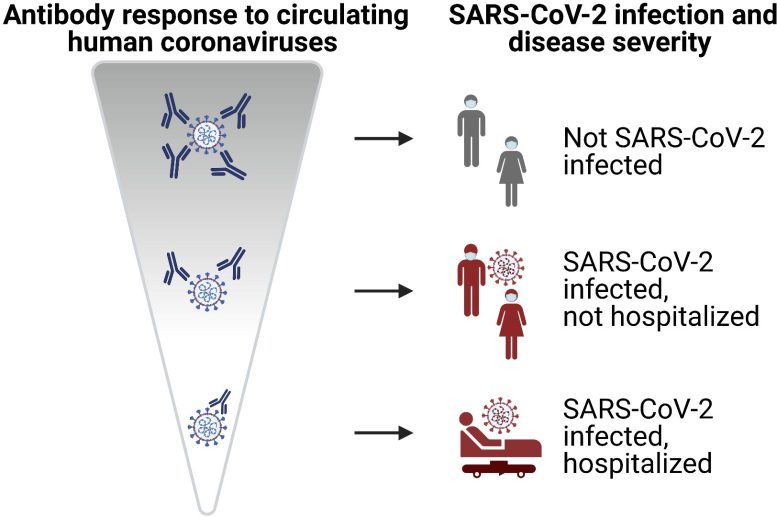Strong antibody responses against harmless coronaviruses also partially protect against SARS-CoV-2.
Infections with the novel coronavirus and vaccination lead to strong antibody responses against
Strong antibody responses against harmless coronaviruses also partially protect against SARS-CoV-2. Credit: University of Zurich
People are only fully protected against SARS-CoV-2 shortly after they have recovered from an infection or have received an effective vaccination. This is when antibody levels against the virus are still very high. As these levels drop over time, infection is no longer prevented, but the immunological memory quickly reactivates the body’s defenses, the production of antibodies as well as the T cell defense. “Of course, immune responses targeting SARS-CoV-2 that are mounted by the memory cells are far more effective than cross-reactive responses. But even though the protection isn’t absolute, cross-reactive immune responses shorten the infection and reduce its severity. And this is exactly what is also achieved through vaccination, just much, much more efficiently,” says Trkola.
Towards comprehensive protection against coronaviruses
It is not yet known whether this cross-reactivity also works in the opposite direction. Whether immunity to SARS-CoV-2 – achieved through vaccination, for example – also offers protection against other human coronaviruses still needs to be elucidated. “If SARS-CoV-2 immunity also offers some degree of protection from infection with other coronaviruses, we would be a significant step closer to achieving comprehensive protection against other coronaviruses, including any new variants,” the virologist explains. This idea is also supported by the fact that cross-reactive protection is not only based on antibodies, but very likely also on T cells.
Reference: “Multifactorial seroprofiling dissects the contribution of pre-existing human coronaviruses responses to SARS-CoV-2 immunity” by Irene A. Abela, Chloé Pasin, Magdalena Schwarzmüller, Selina Epp, Michèle E. Sickmann, Merle M. Schanz, Peter Rusert, Jacqueline Weber, Stefan Schmutz, Annette Audigé, Liridona Maliqi, Annika Hunziker, Maria C. Hesselman, Cyrille R. Niklaus, Jochen Gottschalk, Eméry Schindler, Alexander Wepf, Urs Karrer, Aline Wolfensberger, Silvana K. Rampini, Patrick M. Meyer Sauteur, Christoph Berger, Michael Huber, Jürg Böni, Dominique L. Braun, Maddalena Marconato, Markus G. Manz, Beat M. Frey, Huldrych F. Günthard, Roger D. Kouyos and Alexandra Trkola, 18 November 2021, Nature Communications.
DOI: 10.1038/s41467-021-27040-x
The study was funded through the Pandemic Fund of the University of Zurich, the Swiss Red Cross, the University Hospital Zurich, the Swiss National Science Foundation and Gilead.
